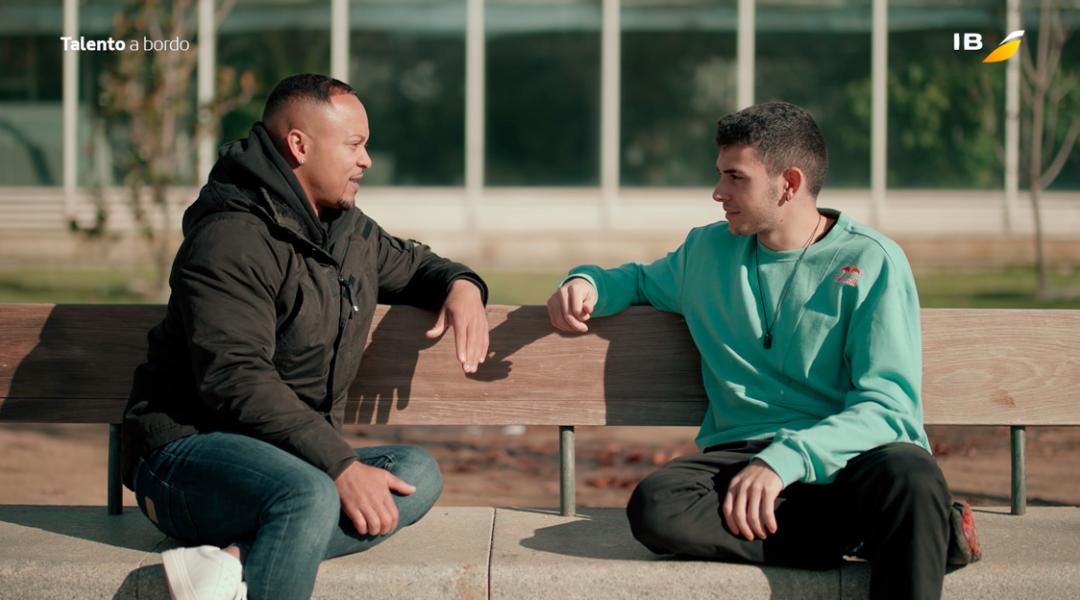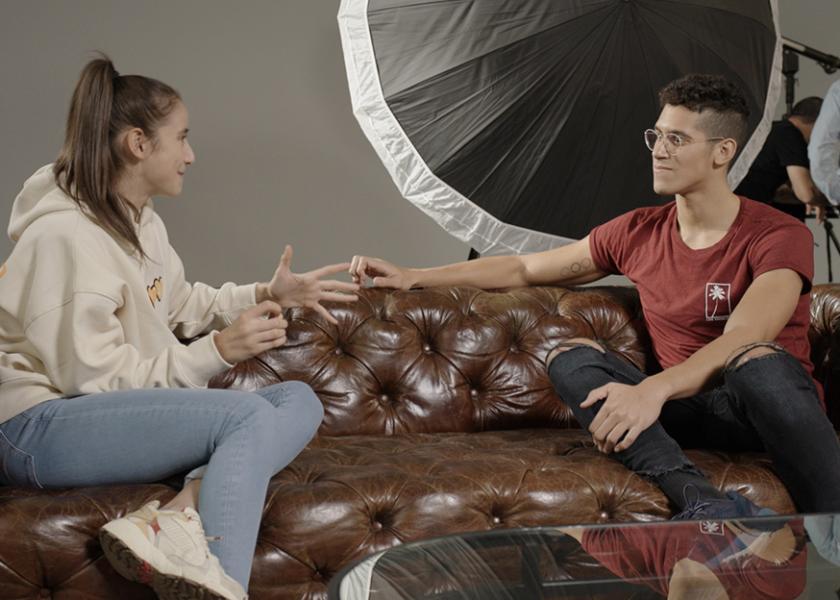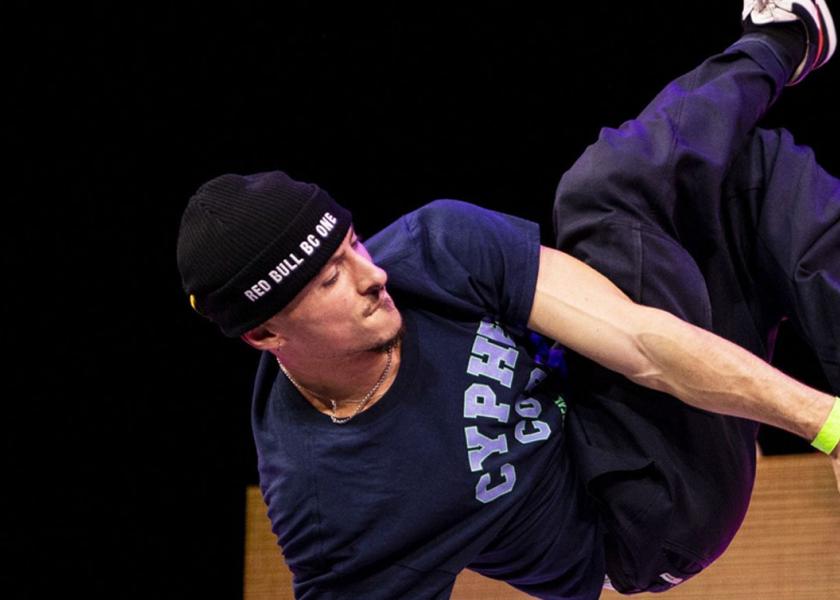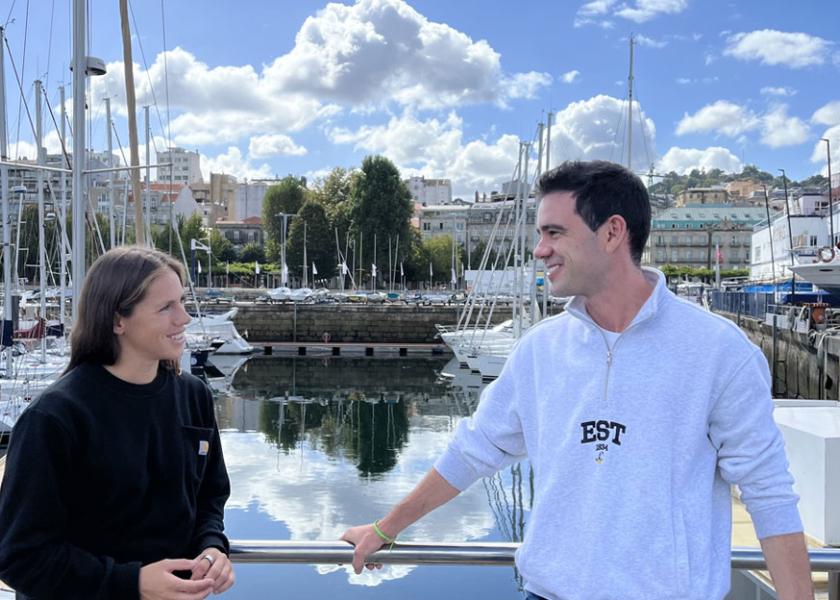Alberto Ginés and Ray Zapata
The Goal: Paris - Ep. 3

Alberto Ginés and Ray Zapata are quite different, but they have several things in common: their passion for their respective sports, climbing and artistic gymnastics, an unquenchable competitiveness, and winning gold and silver medals in Tokyo. They are both also part of the Iberia Talento a bordo Team and, when they get together, between laughter, healthy rivalry and confidences, there’s chemistry.
Both Ray Zapata (Santo Domingo, 1993) and Alberto Ginés (Cáceres, 2002) know what winning a medal at the Games is like. The gymnast won a silver in Tokyo that, although bittersweet at the time —the winner of the gold medal, Israeli Artiom Dolgopiat, achieved the same mark (14.933) and a tie breaker rule tipped the scales in his favour—, now brings a smile to the face of this Dominican-Spaniard. This silver also fuels his motivation for Paris: “Winning a gold medal is something I still dream of. I’ve stayed for another round of training to fight for it, and I think it’s within reach.” Ray is resolutely confident about his chances and that is where part of his success probably lies. “Many laughed when I said my goal was a medal at the Games, but I don’t do gymnastics to prove anything to anyone, but rather to see what I’m capable of.”
“Winning a gold medal is something I still dream of. I’ve stayed for another round of training to fight for it” — Ray Zapata
Alberto’s case was remarkably different. While these were Ray’s second Games and he was a favourite in his discipline (floor), it was Alberto’s debut and even he couldn’t imagine how high he’d get. We just need to remember his surprise when they announced he had won, making him the first sports climbing champion. At just 18, he made history, and it changed his life: “I’ve realised that the Games are the ultimate expression of sport. You win a medal and suddenly the media coverage is crazy.” After a few hectic months, Alberto set himself a goal, winning again in Paris, which is why he works hard daily at the FLASHH Barcelona climbing wall and at the high-performance centre in Sant Cugat (Barcelona), where he lives.
About 600 kilometres away, Ray trains at the high-performance centre in Madrid. But his routine is different to Alberto’s, because the gymnast lives outside of the capital, in Arroyomolinos. There, the person who encourages him to carry on, his daughter Olympia, waits for him with open arms every time he gets home. “When she was born, I found another reason to get out of bed when I was tired and everything hurt. To continue improving and reach my goals.” A little girl that, after the Tokyo Games, became even more famous than her father: “I hadn’t shown her in public, but suddenly my daughter was everywhere and ended up being more famous than me. People stop us on the street and say: Olympia? And you’re Ray, right?” Every time Ray succeeds, the people that remain unconditionally by his side come to mind: “During triumphs, I remember my family because they are there whether I achieve my goals or not. These people are there for me whether I win or lose.”
“When I came to the high-performance centre, I was alone. In fact, I was the first climber here. We slowly built a team” — Alberto Ginés
Despite the distance, family is also a cornerstone for Alberto. He confesses that he has a soft spot for his grandparents: “They are everything to me. We have an incredibly special relationship.” To the point where his grandmother didn’t hesitate to get a tattoo of the rings after her grandson’s achievement in Tokyo, which she shows off proudly whenever she gets the chance. “She’s as happy as a clam with her tattoo, it’s also on her wrist, so whenever she goes to the greengrocer’s she pulls her sleeve up a bit to show off her grandson. She has it all figured out,” Alberto confesses laughing.
Passion and competitiveness
Artistic gymnastics and climbing are not sports a child usually chooses, so the following question arises: how did Ray and Alberto end up doing these sports? In Ray’s case, it all started when he landed in Spain: “Gymnastics came into my life when I landed in Lanzarote. My sisters started doing it and I went to an exhibition. I thought it was only for girls, but I also saw boys doing it and really liked it. I signed up the following day and soon started doing pirouettes mid-air. I knew it was my passion, it was what I wanted to do. I was also quite a hyperactive child, until I discovered gymnastics, and I calmed down.”
“I thought gymnastics was only for girls, but I also saw boys doing it and really liked it. I signed up the following day” — Ray Zapata
For Alberto, climbing started out as a game, probably the best way to win a child over. “I started climbing when I was three. My father noticed that I was always climbing onto everything, so one day he took my sister and I to a climbing wall. It was like a game, seeing who could get higher.” Over time, climbing turned into a lifestyle. “When I was 12 or 13, I started competing and realised it was what I genuinely loved. I wanted to be the best.” To become one of the best climbers in the world, Alberto had to take a tough decision at the age of 15: leave his hometown of Cáceres and move to Sant Cugat. “When I came to the high-performance centre, I was alone. In fact, I was the first climber here. At the beginning it was a bit strange, people would ask me what I was doing here when there wasn’t even a climbing wall. We slowly built a team and there are currently eight of us.”
“Talent is something that helps you when you’re starting out because it makes learning easier, although it’s not everything” — Alberto Ginés
And what role does talent play in elite sports? Ray doesn’t hesitate: For me, talent is innate. You are really born with it, but you have to work on it, polish it, train it. Working on your talent leads to success. I started doing gymnastics very late and lacked technical skills that I managed to polish through hard work.” Alberto agrees on the importance of working hard and adds another variable: discipline. “Talent is something that helps you when you’re starting out because it makes learning easier, although it’s not everything. For me, discipline is more important.”


